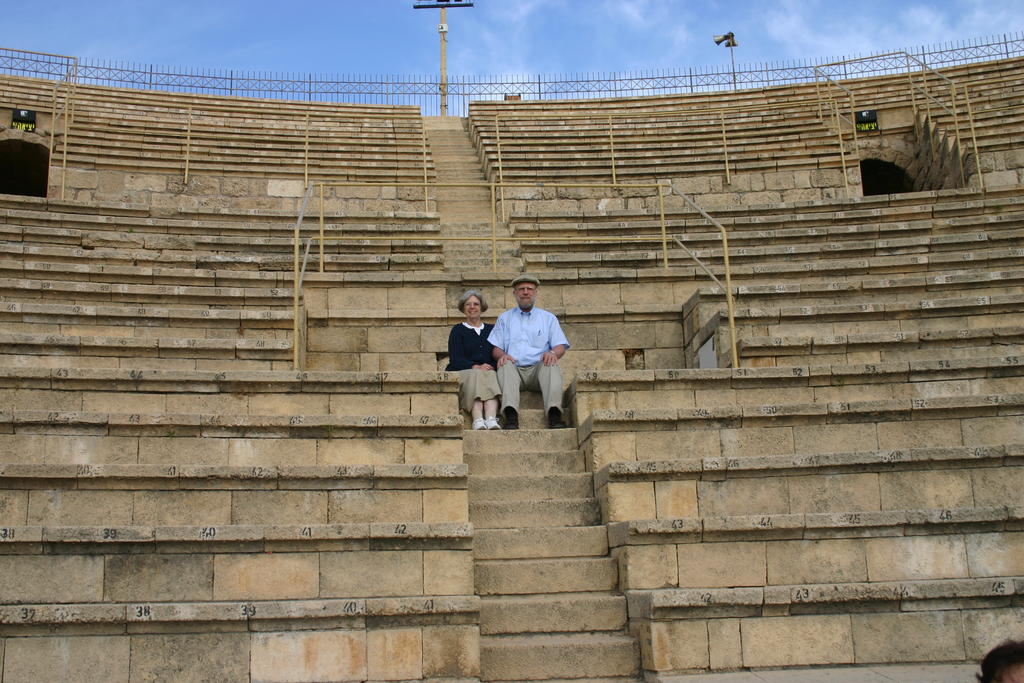A people in harmony: An open letter to Israel’s President Shimon Peres
Issue of August 7, 2009 / 17 Av 5769
Dear Mr. President,
My wife and I recently spent two weeks in Israel where a most unexpected thing happened to us. It seems to me that it is worthwhile to write about it because of what it says about Israelis.
We were traveling from Jerusalem to Caesarea (more precisely to Kibbutz Sedoth Yam) by train, to visit relatives of our neighbors. The trip involved a change of trains at Beit Shemesh and at Tel Aviv, where our problem occurred. I entered the train with my wife right behind me, but much to our surprise, the doors closed before she was able to enter. We both tried to get the doors to open again but they would not and the train started to move.
So there we were, on our way to visit some people, but my wife was left on the platform and I was now in the moving train. I had the tickets and our money, and knew only that a man named Yuval was to pick us up at the station. My wife had the phone number and full names of our hosts, but no money or tickets. As you can imagine, this was most disconcerting.
But now came the interesting part. Many passengers on the platform saw my wife’s distress and rushed to her aid. After all determined that her best language was English, a young couple set out to help her. They got on the next train with her and proceeded to the second station in Tel Aviv, at which I had gotten off. I was on the platform there when I heard an Israeli voice from a train screaming my name. I was unable to see the bearer of this voice, but I got the impression that he might be on the train on the way to Caesarea with my wife.
“We are in Israel so it’s like home, don’t worry,” I thought to myself. But I was somewhat worried anyway. It was my wife’s first time in Israel.
I got on the next train going north and looked for a passenger who might be of assistance. I quickly found one and explained my predicament. Immediately he said, “Let’s contact your wife; do you have a cell phone?” I replied that I did not but my wife did, so he gave me his phone from which to call her. Unfortunately I was unable to locate her number, because hers was a borrowed cell phone. My companion (he was so helpful that I feel I can call him that) then told me that the train we were on didn’t go to Caesarea but to Binyamina. However I could get off at Binyamina where he was detraining and take a train one stop back to Caesarea.
I did this, and took the train south with the hope of finding my wife or Yuval at the Caesarea station. I got off at Caesarea, but saw no one waiting for me there. I did see a young man with a rifle however, who seemed to be a station guard. I asked him to see the stationmaster, hoping that someone had left me a message. He told me that he would help me and would like to do so because it was a good opportunity to practice his English. When I explained my problem, an older gentleman came out of the station house and told me that my wife was already at the kibbutz and Yuval was on his way to get me.
The young couple that had assisted my wife had seen to it that she reached Caesarea. They had alerted the train personnel to our problem and explained to the conductor on the train that my wife had no ticket or money to buy one because we had been separated. The conductor allowed her free passage. All this of course was a great relief.
Why do I think I should bother the president of the country with such a story? The salient feature is that from the time the train doors closed separating my wife and me to the time of our reunion in Caesarea everyone whom we came across tried to help us. In America we read in our newspapers how everything in Israel is tense and how there is strife among Israelis based on religion, politics or ideology. But when someone was in need, all who were available did whatever they could to help. Our helpers, judging by their dress, ranged from secular to haredi, but all were helpful without hesitation.
Mr. President, it seems to me that you should be proud to be head of such a country and that all Israelis should be proud that they have such consideration for others.
Finally a note from our tradition: We learn that in our history tragedy befell the Jewish people because they were not kind to one another — the second Temple was destroyed because of Sinath Hinam; a plague struck the students of Rabbi Akiva because they did not respect each other, etc. The Israel that we saw was one of a people in harmony, of people who really cared about their fellows. Surely the Guardian of Israel will protect such a people and make them prosper. In fact the Israel we saw seemed very prosperous as well.
Most respectfully yours,
David G. Ebin
Stony Brook, NY

 66.0°,
Shallow Fog
66.0°,
Shallow Fog 




